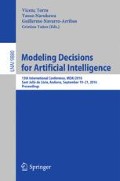Abstract
We suppose that all we know about the preferences of an agent, is given by a (small) collection of relative preferences between choices represented by their evaluations on a set of criteria. Taking lesson from the success of the use of analogical proportions for predicting the class of a new item from a set of classified examples, we explore the possibility of using analogical proportions for completing a set of relative preferences. Such an approach is also motivated by a striking similarity between the formal structure of the axiomatic characterization of weighted averages and the logical definition of an analogical proportion. This paper discusses how to apply an analogical proportion-based approach to the learning of relative preferences, assuming that the preferences are representable by a weighted average, and how to validate experimental results. The approach is illustrated by examples.
Access this chapter
Tax calculation will be finalised at checkout
Purchases are for personal use only
Notes
- 1.
Note that “preference difference” is not to be confused with “arithmetic difference”. For example, a person who wants to buy a car at a maximal price of 20 k€ will in general consider that an arithmetic difference of 1 k€ between 19 and 20 k€ is a worse preference difference than the same arithmetic difference between 14 and 15 k€.
- 2.
A and B suggest that the difference of preference (3, 1) on the third criterion (comfort) is “larger” (or more important) than the difference of preference (4, 3) on the same criterion. Given C, assuming that (2, 3, 3) is not preferred to (4, 1, 1) would reveal contradictory tradeoffs since it implies that, in this context, the difference of preference (4, 3) on the third criterion is larger than (3, 1).
References
Bayoudh, S., Miclet, L., Delhay, A.: Learning by analogy: a classification rule for binary and nominal data. In: Proceedings of the 20th International Joint Conference on Artificial Intelligence (IJCAI 2007), Hyderabad, India, pp. 678–683 (2007)
Bounhas, M., Prade, H., Richard, G.: Ana-logical classification. A new way to deal with examples. In: Proceedings of the ECAI 2014, pp. 135–140 (2014)
Dubois, D., Kaci, S., Prade, H.: Expressing Preferences from Generic Rules and Examples – A Possibilistic Approach Without Aggregation Function. In: Godo, L. (ed.) ECSQARU 2005. LNCS (LNAI), vol. 3571, pp. 293–304. Springer, Heidelberg (2005)
Dubois, D., Prade, H., Richard, G.: Multiple-valued extensions of analogical proportions. Fuzzy Sets Syst. 292, 193–202 (2016)
Fürnkranz, J., Hüllermeier, E., Rudin, C., Slowinski, R., Sanner, S.: Preference Learning (Dagstuhl Seminar 14101). Dagstuhl Rep. 4(3), 1–27 (2014)
Gérard, R., Kaci, S., Prade, H.: Ranking alternatives on the basis of generic constraints and examples - a possibilistic approach. In: Proceedings of the IJCAI 2007, Hyderabad, 6–12 January, pp. 393–398 (2007). In French, Actes LFA 2006, pp. 103–110. Cépaduès 103–110, 2006 (2007)
Greco, S., Mousseau, V., Słowiński, R.: Ordinal regression revisited: Multiple criteria ranking using a set of additive value functions. Eur. J. Oper. Res. 191(2), 416–436 (2008)
Grabisch, M., Kojadinovic, I., Meyer, P.: A review of methods for capacity identification in Choquet integral based multi-attribute utility theory: Applications of the Kappalab R package. Eur. J. Oper. Res. 186(2), 766–785 (2008)
Jacquet-Lagrèze, E., Siskos, Y.: Assessing a set of additive utility functions for multicriteria decision making: the UTA method. Eur. J. Oper. Res. 10, 151–164 (1982)
Jacquet-Lagrèze, E., Siskos, Y.: Preference disaggregation: 20 years of MCDA experience. Eur. J. Oper. Res. 130(2), 233–245 (2001)
Law, M.T., Thome, N., Cord, M.: Quadruplet-wise image similarity learning. In: Proceedings of the IEEE International Conference on Computer Vision (ICCV) (2013)
Miclet, L., Prade, H.: Handling analogical proportions in classical logic and fuzzy logics settings. In: Sossai, C., Chemello, G. (eds.) ECSQARU 2009. LNCS, vol. 5590, pp. 638–650. Springer, Heidelberg (2009)
Modave, F., Dubois, D., Grabisch, M., Prade, H.: A Choquet integral representation in multicriteria decision making. In: Medsker, L. (ed.) Working Notes of the Fall AAAI Symposium “Frontiers in Soft Computing and Decision Systems”, pp. 30–39. In French, Actes LFA 1997, Lyon, pp. 81–90. Cépaduès (1997)
Prade, H., Richard, G.: From analogical proportion to logical proportions. Logica Univers. 7(4), 441–505 (2013)
Wakker, P.: Additive Representations of Preferences: A New Foundation of Decision Analysis. Springer, Heidelberg (1989)
Pirlot, M., Prade, H.: Complétion analogique de préférences obéissant à une intégrale de Choquet. In: Actes 24\(^{emes}\) Conf. sur la Logique Floue et ses Applications, Poitiers, 5–7 November. Cépaduès (2015)
Prade, H., Richard, G.: Reasoning with logical proportions. In: Lin, F., Sattler, U., Truszczynski, M. (eds.) Proceedings of the 12th International Conference on Principles of Knowledge Representation and Reasoning (KR 2010), Toronto, 9–13 May. AAAI Press (2010)
Prade, H., Rico, A., Serrurier, M., Raufaste, E.: Elicitating sugeno integrals: methodology and a case study. In: Sossai, C., Chemello, G. (eds.) ECSQARU 2009. LNCS, vol. 5590, pp. 712–723. Springer, Heidelberg (2009)
Yvon, F., Stroppa, N.: Formal models of analogical proportions. Technical reportD008, Ecole Nationale Supérieure des Télécommunications, Paris (2006)
Author information
Authors and Affiliations
Corresponding author
Editor information
Editors and Affiliations
Rights and permissions
Copyright information
© 2016 Springer International Publishing Switzerland
About this paper
Cite this paper
Pirlot, M., Prade, H., Richard, G. (2016). Completing Preferences by Means of Analogical Proportions. In: Torra, V., Narukawa, Y., Navarro-Arribas, G., Yañez, C. (eds) Modeling Decisions for Artificial Intelligence. MDAI 2016. Lecture Notes in Computer Science(), vol 9880. Springer, Cham. https://doi.org/10.1007/978-3-319-45656-0_12
Download citation
DOI: https://doi.org/10.1007/978-3-319-45656-0_12
Published:
Publisher Name: Springer, Cham
Print ISBN: 978-3-319-45655-3
Online ISBN: 978-3-319-45656-0
eBook Packages: Computer ScienceComputer Science (R0)

